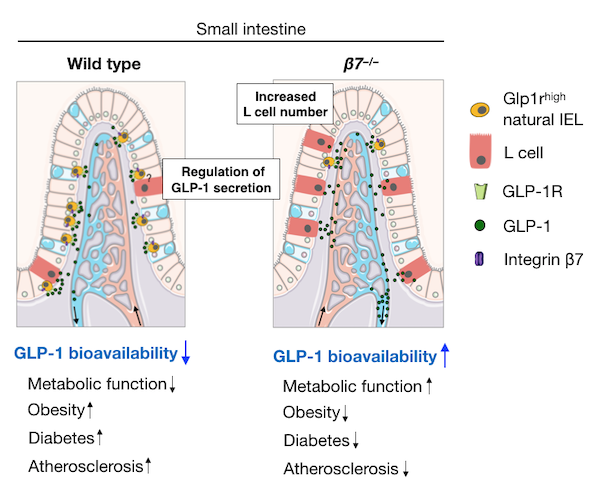Intestinal immune cells play key role in metabolic regulation, cardiovascular health
Mass. General team identifies cells that may determine whether ingested food is stored as fat or used for energy
BOSTON – A Massachusetts General Hospital (MGH) research team has identified what appears to be an important checkpoint in dietary metabolism, a group of cells in the small intestine that slow down metabolism, increasing the amount of ingested food that is stored as fat rather than being quickly converted into energy. In the report published in Nature they find that mice lacking these cells can consume diets high in fat and sugar without developing conditions like obesity, diabetes, hypertension and heart disease.

The team’s study focused on a protein called integrin β7, which is known to direct immune cells to the gut but not previously to have any influence over metabolism. The MGH team initially found that mice lacking the gene for integrin β7 and fed a normal diet gained equal amounts of weight as did a group of control animals, even though the β7-negative animals ate more food and were equally as active. Metabolic testing indicated that the β7-negative mice converted more food into energy, suggesting they had a higher basal metabolism. They also burned more glucose in brown fat, were more glucose tolerant, had lower triglyceride levels and better fat tolerance than did control mice.
To investigate whether these benefits persisted under nutritional conditions known to induce the metabolic syndrome – a group of symptoms associated with type 2 diabetes and cardiovascular disease – they fed both β7-negative mice and control mice a diet high in fat, sugar and sodium. The β7-negative mice remained lean, glucose tolerant, and did not develop hypertension or other typical results of a high-fat diet. The control mice did become obese, with elevated blood pressure and reduced glucose tolerance.
Experiments with a mouse model genetically programmed to develop elevated cholesterol found that blocking β7 expression in the bone marrow, where immune cells are generated, maintained normal lipid levels in the animals, in spite of their being fed a high-cholesterol diet. Mice with β7-negative marrow excreted more cholesterol, had improved glucose tolerance and were less likely to develop arterial plaques and other cardiovascular risk factors than were animals with normal bone marrow expression of β7.
A search for the cells responsible for β7’s metabolic impact revealed that the protein’s expression was highest in a group of T cells present in the lining of the small intestine. While β7 guides several types of immune cells to the intestines, only these β7-expressing intraepithelial T cells appear to regulate systemic metabolism. Swirski’s team showed they do so by reducing levels of a protein called GLP-1, which normally increases metabolism by stimulating insulin secretion and glucose uptake.
Swirski explained that the metabolism-suppressing role of β7-positive intraepithelial T cells might have developed to prevent starvation under conditions of nutrient scarcity. “At times when the availability of food is uncertain, it would be advantageous to have a system that converts some of the energy ingested with food into fat. But during times of over-nutrition, such a system can backfire and lead to the cardiovascular disease that is so prevalent today,” he says.
“Now we have a lot of questions to investigate – exactly how these cells limit the availability of GLP-1, whether people with a higher metabolism have fewer of these cells, how the cells’ function may change over the course of a day or a lifetime, and whether blocking these cells can be beneficial in treating obesity, diabetes, hypertension and atherosclerosis.” Swirski is an associate professor of Radiology at Harvard Medical School.
The co-lead authors of the Nature paper are Shun He, PhD, Florian Kahles, MD, and Sara Rattik, all at the MGH Center for Systems Biology. The Swirski lab (@SwirskiLab) also collaborated with Ralph Weissleder, MD, PhD, and Matthias Nahrendorf, MD, MGH Center for Systems Biology; Peter Libby, MD, Brigham and Women’s Hospital; Carlos Fernandez-Hernando, PhD, Yale University, and Daniel Drucker, MD, Mount Sinai Hospital, Toronto. Support for the study includes National Institutes of Health grants R35 HL135752, R01 HL128264, P01 HL131478 and the American Heart Association Established Investigator Award. Swirski is the Patricia and Scott Eston MGH Research Scholar.
Article
He S*, Kahles F*, Rattik S*, Nairz M, McAlpine CS, Anzai A, Selgrade D, Fenn AM, Chan CT, Mindur JE, Valet C, Poller WC, Halle L, Rotllan N, Iwamoto Y, Wojtkiewicz GR, Weissleder R, Libby P, Fernández-Hernando C, Drucker DJ, Nahrendorf M, Swirski FK
Gut intraepithelial T cells calibrate metabolism and accelerate cardiovascular disease
Nature. 2019; DOI: 10.1038/s41586-018-0849-9
News coverage
Gut immune cells have a role in food metabolism – Nature News and Views
Immune cells in the gut may explain why some people can’t lose weight – NBC News
Some gut cells slow down metabolism, accelerate cardiovascular disease – ScienceDaily
Immune cells in the gut may explain why some people can’t lose weight – WRCBtv
Could blocking these immune cells aid weight loss? – Medical News Today
Gut immune cells linked to obesity, heart disease – FierceBiotech
Intestinal immune cells play key role in metabolic regulation, cardiovascular health – Medical Xpress
Gut Immune Cells Slow Down Metabolism And May Explain Why Some People Tend To Get Fat – TechTimes
Gut immune cells could be responsible for metabolism changes finds study – News Medical
Gut cells that help conserve fat may be a target for obesity treatment: study – Xinhua
Las células inmunitarias intestinales tienen un papel clave en la regulación metabólica – Canarias7
Células intestinales que ayudan a conservar grasa podrían ser un objetivo en tratamiento de obesidad – People Daily
Las células inmunitarias intestinales, claves en la salud cardiovascular – infosalus.com
Scoperte cellule intestinali nei topi che rallentano metabolismo e aumentano obesità, diabete e ipertensione – Notizie Scientifiche